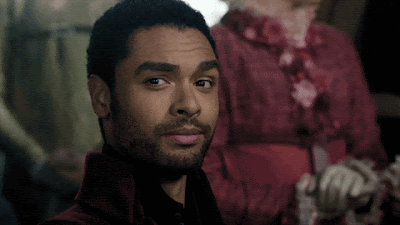I don’t know how they do it, but Netflix always seem to know just what
we need. It’s Christmas Day 2020. Everyone is coming to terms with substantial compromises
to their celebrations, potentially stranded far from home by following the
whiplashing advice from the old boys’ club running our government. The weather is crap, the year is being wished
over, and little do we know, the next one is going to be getting off to the
most underwhelming of starts. And pow,
Netflix drops the most optimised dollop of delicious escapism right in front of
our eyeballs. That’s right, this week we’re
doing Bridgerton.
Regular readers won’t be surprised to know that I was very
late to this party. Spirited away to my
parents’ just before London was turned into an inescapable fortress, their
loyalty to live TV had driven me away into my Louis
Theroux documentaries. Returning to
my home and work (which have now been the same place for nearly a year – I can’t
confirm if I will ever wear underpants again), everyone was talking about one
thing: Bridgerton. I resisted its
call. I didn’t need to follow the herd. I was deep in other series (wondering if The Sopranos would ever end). Its mania would pass. But then, instead, it snowballed. Every other Guardian article (I ignore all other
news – no surprises there) was about its music or its fashion. It was revealed as the most watched Netflix production. My interest was piqued. Then everyone chuckled at the explicit sexual
content and, lo and behold, I was sold.
The eight episodes are based on the first in a series of novels
that follow the fictional Bridgerton family.
Named alphabetically, they’re an A to Z (well, an Anthony to Hyacinth)
of upper-class London society in 1813.
We’re with them for a social season, from the young ladies’ debuts
through weeks and weeks of balls balls balls until a final climax that sees all
the lords and such retire back to their country piles. Here’s the first reason Bridgerton’s timing are
spot on: all these well-attended events are spectacles we can only dream
of. Right now, a good day out is a mask-clad
whiz round the supermarket. A lavish
night of dancing and drinking, dressed up to the nines, is as alien to us as
most of the social conventions of nineteenth-century Britain, but it is so richly
and colourfully brought to life on screen that it has the power to fill that
part of our lives that is so sorely lacking.
There’s even a nod to our present day, with the string quartets treating
us to classical interpretations of modern pop songs.
While we’re at it, the costumes are a second well-tuned
route for vicarious living. Most of us
are now set in our leisurewear (please see earlier comment about underpants),
but the lords and ladies of Bridgerton are never out of excuses to push the sartorial
boat out. Even the discomfort of very
tight breeches or having your cleavage shoved up beyond your clavicle offers a
welcome break to shuffling about our homes in slippers and hoodies, with the
exception of the Featheringtons’ sickly colour palette.
Thirdly, the show is on the pulse of our enthusiasm for
diversity, putting black Georgians front and centre. No need to explain, no indulgence of anyone
feeling threatened; it’s just a great time.
Any protest with reference to historical accuracy is farcical, and probably
from the same people who wanted The Crown
accompanied by trigger warnings. Some
people simply don’t deserve content this entertaining.
But lastly, it is just the story for the moment. In a foreign world of ladies’ reputations,
archaic courtship and primogeniture, there is a welcome frivolity to the
various love stories. Bosoms heave,
sideburns protrude, and eyes are made across the ballroom, and we’re unable to
resist caring about girls making a good match and marrying for love. Some jeopardy is clunkily contrived, with Anthony
Bridgerton (Jonathan
Bailey – a key player from W1A and Crashing) going from key barrier to his
sister’s happiness to someone without quite enough to do, and the endless
speculation regarding the real identity of Lady Whistledown (Gossip Girl gone Georgian) lacking compelling
consequence. But once the love making
starts, we’re miles away from the grit and realism of something like Normal People and drinking in every romantic
thrust of some good old-fashioned shagging.
You don’t get that in Downton Abbey. Yet the shenanigans don’t feel gratuitous –
they’re just another layer of fun in all the stories. More remarkable is the sheer size of the
cast, with every peripheral player committing wholeheartedly from the start,
gradually coming forward as fully formed characters as the episodes progress.
Sure, the script could have done with one more proof-read to tighten the lines beyond the point of simply aping how people probably spoke in the olden days, and maybe some of the cast are guilty of doing theatre acting with their shouting and enunciating, but there’s little to fault with Bridgerton if you’re looking for a hearty romp. I would even go as far to prescribe this as self-care at a time when reasons to be cheerful may appear to be lacking. Switch off the 5pm briefing when we get put into surprise tier 22 and take yourself off to the world created by Julia Quinn and realised by Shonda Rhimes (How To Get Away With Murder, among many other things). It’s a treat we all deserve, and it’s come at just the right time.








No comments:
Post a Comment